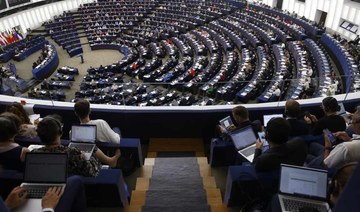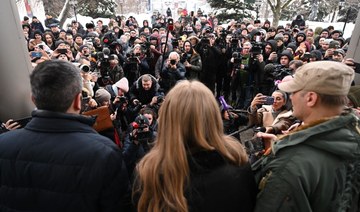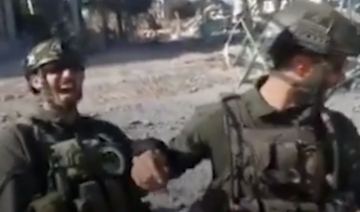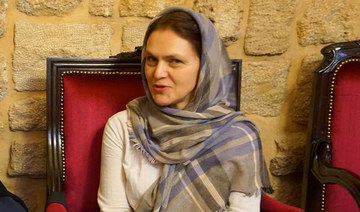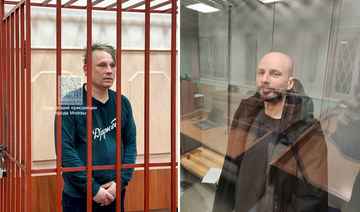KABUL, Afghanistan: Fear accompanies reporter Banafsha Binesh from the moment she leaves her Kabul home each morning for the newsroom at Afghanistan’s largest television station.
It starts with the Taliban fighters, who roam the streets of the capital with weapons slung over their shoulders. Binesh, 27, says she is frightened by their reputation of harshness toward women, rather than any unsavory encounter.
Dread and uncertainty mount with every new report of a fellow journalist having been detained, interrogated or beaten by Taliban fighters.
“Working is full of stress,” said Binesh, who works for TOLO-TV.
Since taking power six months ago, the country’s new rulers have also issued directives requiring journalists to keep Islamic principles in mind and work for the good of the nation — rules that would seem aimed at quashing independent reporting.
Bilal Karimi, a deputy spokesman for the Culture and Information Ministry, said criticism is tolerated, but must be constructive.
He blamed attacks on journalists — often while they cover women’s protests, explosions, and other news — on over-zealous Taliban. Other arrests of journalists were not linked to their work, he claimed.
Steven Butler from the Committee to Protect Journalists said it’s not clear yet if attacks on journalists are systematic or “just semi-random events initiated by some Taliban official who has a grudge.”
“I would describe the landscape as full of hazards that are not fully predictable,” said Butler, the Asia program director at CPJ. “Journalists are being selectively picked up, interrogated about their coverage, beaten, and then released after hours or days.”
Most recently, two journalists working for the UN refugee agency were held for six days and released last week after the UN raised alarms. The Taliban said they released the journalists after confirming their identities.
Butler expressed concerns that Taliban intelligence officials are becoming more “hands-on” and have increasingly been implicated in arrests and disappearances.
In one trend-bucking development, TOLO now has more female than male journalists, both in the newsroom and out on the streets.
TOLO news director Khpolwak Sapai said he made a point of hiring women after nearly 90 percent of the company’s employees fled or were evacuated in the first days of the Taliban takeover.
He said female staffers have not been threatened by the Taliban authorities but have at times been denied access because of their gender.
In one case, a TOLO reporter was barred from a briefing by the acting minister of mines and petroleum when he found out the station had sent a woman to the event.
Sapai said TOLO promptly does stories on such incidents.
The ranks of journalists in Afghanistan thinned dramatically during the chaotic days of the Taliban takeover in August. Tens of thousands of Afghans fled or were evacuated by foreign governments and organizations.
A December survey by Reporters Without Borders and the Afghan Independent Journalist Association found that 231 out of 543 media outlets had closed, while more than 6,400 journalists lost their jobs after the Taliban takeover. The outlets closed for lack of funds or because journalists had left the country, according to the report.
During their previous rule in the late 1990s, the Taliban had no opposition and banned most television, radio and newspapers. Foreign news organizations were able to operate at that time, along with some local outlets.
Faisal Mudaris, a broadcast journalist, blogger and YouTube personality, spent eight days in Taliban custody, where he said he was beaten and threatened.
Mudaris is from the restive Panjshir Valley, the only holdout against Taliban rule during their first weeks in power. Mudaris fears his ethnicity as a Panjshiri, not his journalism, landed him in a Taliban lockup. He believes he remains at risk, fearing that no one can hold the Taliban accountable.
Journalists from other ethnic minorities, including the Hazaras who have long faced discrimination from successive governments, also worry. In the first months after the Taliban takeover, several journalists of a small outlet called Etilaat Roz were arrested and beaten. Both were Hazaras.
Karimi denies anyone is targeted because of their ethnicity and promises investigations will be carried out against offending Taliban. CPJ’s Butler said his advocacy group has no way to measure attacks based on ethnicity.
Still, there appears to be some room for critical reporting under the Taliban. For example, TOLO repeatedly aired a clip of Taliban fighters beating a former Afghan soldier.
Within days, top Taliban leader Hibatullah Akhunzada warned Taliban fighters against excesses, saying they would be punished. He reiterated a promise of amnesty for former soldiers.
“Did the news story bring about a change? I want to think it contributed to it,” said Sapai, the TOLO news director.
Sapai said views among the Taliban range from those who cling to the strict views of the past, to those who want a more open society that embraces education and work for all — including girls and women.
He believes domestic and external pressures on the Taliban should not be underestimated. “Most of the Taliban leadership accept that Afghanistan and the world is different now and it’s hard to turn back the clock but still the differences exist among them,” he said.
It’s the uncertainty about which view will prevail that has journalists worried.
“The fear that we have is for the day in the future when the Taliban will prevent us from the work that we do,” said TOLO reporter Asma Saeen, 22. “This is my big fear and my constant anxiety.”
She has no recollection of the harsh Taliban rule of the 1990s and said she has been able to work unhindered. Yet she resents the many restrictions imposed on girls and women, including banning teen-age girls from returning to school, at least for now, and many women not being allowed to return to their jobs.
Both Saeen and Binesh want to leave Afghanistan, saying they long for the freedoms they enjoyed before the Taliban swept to power.
“We were not expecting that after 20 years of democracy to face these many restrictions,” said Binesh. “I am ready to go.”
Fear runs through Afghanistan’s ‘hazardous’ media landscape
https://arab.news/g557c
Fear runs through Afghanistan’s ‘hazardous’ media landscape

- Dread and uncertainty mount with every new report of a fellow journalist having been detained, interrogated or beaten by Taliban fighters
EU bans 4 more Russian media outlets from broadcasting in the bloc, citing disinformation

- The EU has already suspended Russia Today and Sputnik among several other outlets since February 2022
BRUSSELS: The European Union on Friday banned four more Russian media outlets from broadcasting in the 27-nation bloc for what it calls the spread of propaganda about the invasion of Ukraine and disinformation as the EU heads into parliamentary elections in three weeks.
The latest batch of broadcasters consists of Voice of Europe, RIA Novosti, Izvestia and Rossiyskaya Gazeta, which the EU claims are all under control of the Kremlin. It said in a statement that the four are in particular targeting “European political parties, especially during election periods.”
Belgium already last month opened an investigation into suspected Russian interference in June’s Europe-wide elections, saying its country’s intelligence service has confirmed the existence of a network trying to undermine support for Ukraine.
The Czech government has imposed sanctions on a number of people after a pro-Russian influence operation was uncovered there. They are alleged to have approached members of the European Parliament and offered them money to promote Russian propaganda.
Since the war started in February 2022, the EU has already suspended Russia Today and Sputnik among several other outlets.
Israeli soldiers post abusive videos despite army’s pledge to act: BBC analysis

- The BBC analyzed 45 photos and videos posted online by Israeli soldiers that showed Palestinian prisoners in the West Bank being abused and humiliated
LONDON: Israeli soldiers continue to post videos of abuse against Palestinian detainees despite a military pledge to take action against the perpetrators, analysis by the BBC has found.
The broadcaster said it had analyzed 45 photos and videos posted online by Israeli soldiers that showed Palestinian prisoners in the West Bank being abused and humiliated. Some were draped in Israeli flags.
Experts say the footage and images, which showed Palestinians being stripped, beaten and blindfolded, could breach international law and amount to a war crime.
The Israel Defense Forces said some soldiers had been disciplined or suspended for “unacceptable behavior” but did not comment on the individual cases identified by the BBC.
The most recent investigation into social media misconduct by Israeli soldiers follows a previous inquiry in which BBC Verify confirmed Israeli soldiers had filmed Gazan detainees while beating them and then posted the material on social platforms.
The Israeli military has carried out arbitrary arrests across Gaza and the West Bank, including East Jerusalem, since the Hamas attack on Oct. 7. The number of Palestinian prisoners in the West Bank has since risen to more than 7,060 according to the Commission of Detainees’ Affairs and the Palestinian Prisoner Society.
Ori Givati, spokesperson for Breaking the Silence, a non-governmental organization for Israeli veterans working to expose wrongdoing in the IDF, told the BBC he was “far from shocked” to hear the misconduct was ongoing.
Blaming “current far-right political rhetoric in the country” for further encouraging the abuse, he added: “There are no repercussions. They [Israeli soldiers] get encouraged and supported by the highest ministers of the government.”
He said this played into a mindset already subscribed to by the military: “The culture in the military, when it comes to Palestinians, is that they are only targets. They are not human beings. This is how the military teaches you to behave.”
The BBC’s analysis found that the videos and photos it examined were posted by 11 soldiers of the Kfir Brigade, the largest infantry brigade in the IDF. None of them hid their identity.
The IDF did not respond when the BBC asked about the actions of the individual soldiers and whether they had been disciplined.
The BBC also attempted to contact the soldiers on social media. The organization was blocked by one, while none of the others responded.
Mark Ellis, executive director of the International Bar Association, urged an investigation into the incidents shown in the footage and called for the IDF to discipline those involved.
In response to the BBC’s investigation, the IDF said: “The IDF holds its soldiers to a professional standard … and investigates when behavior is not in line with the IDF’s values. In the event of unacceptable behavior, soldiers were disciplined and even suspended from reserve duty.
“Additionally, soldiers are instructed to avoid uploading footage of operational activities to social media networks.”
However, it did not acknowledge its pledge to act on BBC Verify’s earlier findings in Gaza, according to the broadcaster.
4 journalists killed in Gaza as death toll climbs above 100

- 104 Palestinian media workers reported dead, along with 3 Lebanese and 2 Israelis
LONDON: The Gaza Media Authority on Thursday said that four journalists had been killed in an Israeli airstrike, bringing the total number of journalists killed in the conflict to more than 100.
The victims were identified as Hail Al-Najjar, a video editor at the Al-Aqsa Media Network; Mahmoud Jahjouh, a photojournalist at the Palestine Post website; Moath Mustafa Al-Ghefari, a photojournalist at the Kanaan Land website and Palestinian Media Foundation; and Amina Mahmoud Hameed, a program presenter and editor at several media outlets, according to the Anadolu Agency.
The Gaza Media Office said the four were killed in an Israeli airstrike, but did not provide additional details on the circumstances surrounding their deaths.
A total of 104 Palestinian journalists have been killed since the conflict began on Oct. 7. Two Israeli and three Lebanese media workers also have been killed.
The latest loss adds to the already heavy toll on media workers, with the Committee to Protect Journalists saying the Gaza conflict is the deadliest for journalists and media workers since it began keeping records.
Israel is continuing its offensive on Gaza despite a UN Security Council resolution demanding an immediate ceasefire.
On Thursday, South Africa, which has brought a case accusing Israel of genocide to the International Court of Justice, urged the court to order Israel to halt its assault on Rafah.
According to Gaza medical authorities, more than 35,200 Palestinians have been killed, mostly women and children, and over 79,200 have been injured since early October when Israel launched its offensive following an attack by Hamas.
Russia outlaws SOTA opposition news outlet

- Authorities said outlet tries to destabilize the socio-political situation in Russia
- Move could criminalize SOTA content and puts its reporters at risk of arrest
LONDON: Russia declared opposition media outlet SOTA “undesirable” on Thursday, a move that could criminalize the sharing of its content and put its reporters at risk of arrest.
Authorities in Russia have declared dozens of news outlets, think tanks and non-profit organizations “undesirable” since 2015, a label rights groups say is designed to deter dissent.
In a statement, Russia’s Prosecutor General accused SOTA of “frank attempts to destabilize the socio-political situation in Russia” and “create tension and irritation in society.”
“Such activities, obviously encouraged by so-called Western inspirers, have the goal of undermining the spiritual and moral foundations of Russian society,” it said.
It also accused SOTA of co-operating with TV Rain and The Insider, two other independent Russian-language outlets based outside of the country that are linked to the opposition.
SOTA Project, which covers opposition protests and has been fiercely critical of the Kremlin, denied it had anything to do with TV Rain and The Insider and rejected the claims.
But it advised its followers in Russia to “remove reposts and links” to its materials to avoid the risk of prosecution. SOTA’s Telegram channel has around 137,000 subscribers.
“Law enforcement and courts consider publishing online to be a continuing offense. This means that you can be prosecuted for reposts from 2023, 2022, 2021,” it said.
SOTA Project was born out of a split with a separate news outlet called SOTAvision, which still covers the opposition but distanced itself from the prosecutors’ ruling on Thursday.
Since launching its offensive in Ukraine, Moscow has waged an unprecedented crackdown on dissent that rights groups have likened to Soviet-era mass repression.
Among other organizations labelled as “undesirable” in Russia are the World Wildlife Fund, Greenpeace, Transparency International and Radio Free Europe/Radio Liberty.
OpenAI strikes deal to bring Reddit content to ChatGPT

- Deal underscores Reddit’s attempt to diversify beyond its advertising business
- Content will be used to train AI models
LONDON: Reddit has partnered with OpenAI to bring its content to popular chatbot ChatGPT, the companies said on Thursday, sending the social media platform’s shares up 12 percent in extended trade.
The deal underscores Reddit’s attempt to diversify beyond its advertising business, and follows its recent partnership with Alphabet to make its content available for training Google’s AI models.
ChatGPT and other OpenAI products will use Reddit’s application programming interface, the means by which Reddit distributes its content, following the new partnership.
OpenAI will also become a Reddit advertising partner, the company said.
Ahead of Reddit’s March IPO, Reuters reported that Reddit struck its deal with Alphabet, worth about $60 million per year.
Investors view selling its data to train AI models as a key source of revenue beyond Reddit’s advertising business.
The social media company earlier this month reported strong revenue growth and improving profitability in the first earnings since its market debut, indicating that its Google deal and its push to grow its ads business were paying off.
Reddit’s shares rose 10.5 percent to $62.31 after the bell. As of Wednesday’s close, the stock is up nearly 12 percent since its market debut in March.





